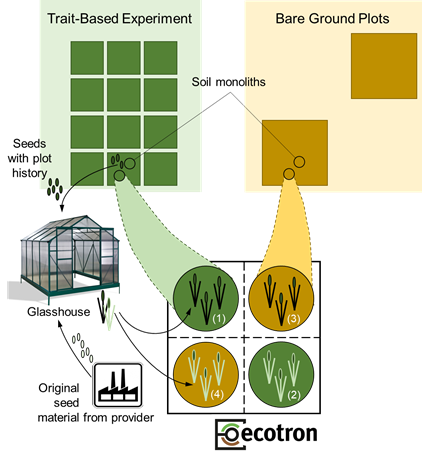iDiv Ecotron Experiments
Current Experiment(s)
JenaTron
How does plant and soil interaction history modify relationships between biodiversity and ecosystem functioning?

Over the last three decades, concern about species loss has motivated many studies that experimentally reduce species richness and examine the consequences for ecosystem functioning. So far, results have shown that there is generally a positive association between plants species richness and ecosystem functioning (BEF). Moreover, the strength of this relationship typically gets stronger over time, which can be seen as enhanced functioning in diverse plots, and reduced functioning in monocultures, In Spring and Summer 2022 the JENATRON experiment will test whether the strengthening BEF relationship over time is driven by soil community assembly, shared plant history, or a combined effect of both factors. JENATRON will be established in the iDiv Ecotron facility using a plant diversity gradient from 1 to 3 species from the Trait Based Experiment of the Jena Experiment factorially crossed with soil history and plant history. Soil History (+/- SH) will be established by excavating intact monoliths from the Trait Based Experiment (+SH) or from bare ground plots (-SH). Plant History (+/- PH) will be established using two seed sources: seeds harvested from plants growing in the Trait Based Experiment for 12 years (+ PH), and original seed material used to set up the Trait Based Experiment (-PH). The independent crossing of soil history and plant history for each level of plant species richness results in the following four treatments in each ecounit: (1) "with plant history, with soil history"; (2) "without plant history, with soil history"; (3) "with plant history, without soil history"; and (4) "without plant history, without soil history". Eleven sub-projects of the Jena Experiment Research Unit will work closely together to investigate the independent and interactive effects of plant history and soil history on BEF relationships. Response variables will be measured from many research areas including microbiology, chemical ecology, phenology, proximal sensing, genomics and food web modelling. If soil or plant history alter BEF relationships, an important implication of the results is that novel communities without shared history could be a poor surrogate for long-term conservation.
